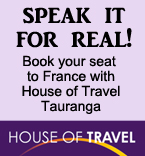Heading for Europe
Allure of the low euro
(7).jpg)
The low euro lures NZ tourists to Europe
The number of Kiwis holidaying in Europe is tipped to return to pre-recession levels, with experts predicting the region's currency will fall to record low levels in the coming months.
New Zealand's dollar came within touching distance of the highest level it has traded against the euro since the currency, used by 17 European Union countries including Germany, France, Italy and Spain, was formed in 2001.
The kiwi hit 0.6151 about noon yesterday, just below the record 0.6170 reached in 2011. Just before 6pm last night it was trading at 0.6147 as markets awaited news from a meeting between German Chancellor Angela Merkel and French President Nicolas Sarkozy in Berlin overnight.
Currency strategists yesterday predicted the New Zealand dollar could move significantly higher against the euro, the world's second-largest currency behind the US dollar.
BNZ's Mike Jones said in the coming months the kiwi could reach 0.65 as the region plunges into recession this year.
"With growth in the eurozone collapsing into recession, and no end in sight at the moment to the sovereign debt crisis, you could expect the euro to weaken ... We could push a fair bit higher yet."
A strong exchange rate makes the kiwi buy more overseas, but makes our exports more costly.
Europe's significance to New Zealand exporters is declining. The region took $5.2 billion in exports in the year to June 30, 2011, down from $5.9b two years earlier.
However it remains a major source of tourism, in both directions. Excluding Britain, about 76,000 Kiwis went on holiday in Europe in the year ended June, while 220,000 Europeans came here on short visits, although the number is in decline.
Brent Thomas, retail manager at House of Travel, said forward bookings for travel to Europe were more than 20 per cent ahead of a year ago, and they could reach the pre-recession levels of 2008.
Travellers had deferred trips for several years over economic concerns. However, they were now booking, discovering their budgets would carry them further than expected because of the strong dollar and weakness in markets elsewhere.
"Even beyond the currency, because the Americans aren't travelling, there's been some fantastic pricing out of both the airlines and the hoteliers in Europe," Thomas said.
"If you've got a hotel or a plane, it doesn't make any money unless you've got someone in it."
Thomas said the strong kiwi was also boosting travel to the United States and Asia.
"The whole long-haul sector has increased."
The euro had been falling sharply since Christmas as the markets digest the possibility that some member states will default on their debts, and the expectation that authorities will attempt to inject more money into the financial system, Westpac currency strategist Imre Speizer said.
HAMISH RUTHERFORD
